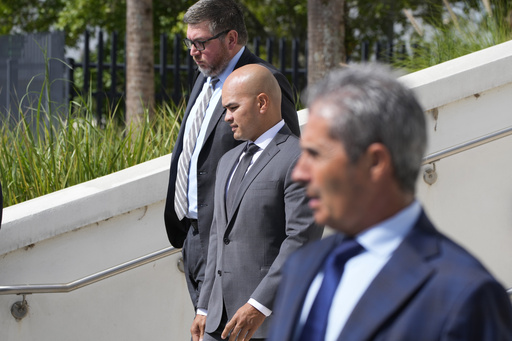FORT PIERCE, Fla. (AP) — Lawyers for two co-defendants of former President Donald Trump in the classified documents case asked a judge on Friday to dismiss charges against them.
Trump valet Walt Nauta and Mar-a-Lago property manager Carlos De Oliveira are charged with conspiring with Trump to obstruct an FBI investigation into the hoarding of classified documents at the former president’s Palm Beach estate. All three have pleaded not guilty.
Lawyers for Nauta and De Oliveira asked U.S. District Judge Aileen Cannon during a Friday afternoon hearing to throw out the charges they face, a request opposed by special counsel Jack Smith’s team, which brought charges against them and Trump. The judge did not immediately rule.
The two Trump aides are not charged with illegally storing the documents but rather with helping Trump obstruct government efforts to get them back.
Prosecutors say that Nauta, in 2022, moved dozens of boxes from a storage room at Mar-a-Lago to Trump’s residence in an apparent effort to prevent their return to the government, and that he and De Oliveira conspired with Trump to try to delete surveillance video that showed the movement of the boxes and that was being sought by the FBI.
Defense lawyers have disputed that accusation. Lawyers for the men argue that there is no allegation that either man knew that the boxes contained sensitive government records.
“The Superseding Indictment does not allege that Mr. De Oliveira ever saw a classified document. It does not allege that Mr. De Oliveira was aware of the presence of any classified documents in the boxes that he moved,” lawyers for De Oliveira wrote in court filings, adding that there was no evidence he was aware of any government investigation at the time he helped move boxes in the property.
“The only person benefiting from these acts was former President Trump,” a lawyer for Nauta, Stanley Woodward, said in court Friday.
Trump, Republicans’ presumptive presidential nominee, has separately filed multiple motions seeking to dismiss charges against him. Cannon has denied two that were argued last month — one that said the Espionage Act statute at the heart of the case was unconstitutionally vague, the other that asserted that Trump was entitled under a 1978 law called the Presidential Records Act to retain the classified files as his personal property after he left the White House following his 2020 election loss to Democrat Joe Biden.
___
Tucker reported from Washington.
This website uses cookies so that we can provide you with the best user experience possible. Cookie information is stored in your browser and performs functions such as recognising you when you return to our website and helping our team to understand which sections of the website you find most interesting and useful.
